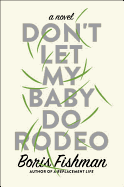
| Publisher: | Harper | |
| Genre: | Fiction, Cultural Heritage, Contemporary Women, Family Life | |
| ISBN: | 9780062384362 | |
| Pub Date: | March 2016 | |
| Price: | $26.99 |
| Starred | Fiction |
by Boris Fishman
Leavened with a healthy dose of the history, culture and culinary arts of Eastern European Jewish immigrants in New Jersey, Boris Fishman's second novel (after A Replacement Life) tells the story of Alex and Maya Rubin and their nine-year-old adopted son, Max, whose Montana birth parents handed him over with the admonition: "Don't let my baby do rodeo."
Struggling to overcome the insecurity of separation from her Ukraine family, Maya meets Alex and marries him out of young love (and to get U.S. citizenship). When they discover they cannot have children, Maya takes charge of adoption over the strong objection of Alex and his Belarus-born busybody parents, who hold that "adopted children were second-class, by definition unwanted... used human being[s]."
A healthy baby, Max develops into a reclusive, almost feral, child who immerses himself in the natural world. Alex takes this to confirm his reluctance to adopt "because you get genes that belong to somebody else." Maya thinks this makes Max special and, becoming more self-assured, she insists that they drive to Montana to meet the birth parents and see Max's roots for themselves.
With graceful control and assurance, Fishman turns Don't Let My Baby Do Rodeo into a layered story of identity and the challenges of weaving our many differences into compassionate bonds. So many things can drive a family apart; it's a wonder that Alex, Maya and Max (or any of us) can hold it together. Immigration and adoption are not for wimps. Writing well about them is a true art. Fishman is very much up to the task--heartbreak, headaches, happiness and all. --Bruce Jacobs, founding partner, Watermark Books & Cafe, Wichita, Kan.
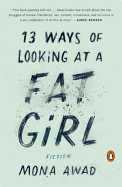
| Publisher: | Penguin Books | |
| Genre: | Fiction, Coming of Age, Contemporary Women, Literary | |
| ISBN: | 9780143128489 | |
| Pub Date: | February 2016 | |
| Price: | $16 |
| Fiction |
by Mona Awad
Mona Awad's novel 13 Ways of Looking at a Fat Girl opens with Lizzie March's unhappy adolescent years, where readers are introduced to an overweight girl who craves acceptance and love. Lizzie is insecure and over-sexualized by everyone around her, to the point where she believes her worth is defined by the attention her appearance elicits. Again and again, Lizzie hears that her only worth is in being skinny. The few men in her life tell her fat girls have to "do anything"--they must please their partners or risk losing them. When she looks in a mirror, she no longer sees herself, or even a person; she sees just a set of flaws she has to fix.
In this way, Awad shapes body shame as a dissociative experience. After she loses weight through restrictive diets and obsessive exercise, Lizzie's life is both comical and miserable. She devolves into a food-obsessed gym rat, whose hours logged on a treadmill leave her feeling wholly without traction in her life. She fixates on constantly controlling her appearance to please others. Awad weaves in cutting humor that makes this tragic story funny and familiar. With tact and wit, Awad captures the pain and absurdity of a disturbing norm that many girls and women are subjected to. --Justus Joseph, bookseller at Elliott Bay Book Company
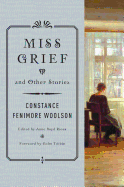
| Publisher: | W.W. Norton | |
| Genre: | Fiction, Short Stories (single author), Literary | |
| ISBN: | 9780393352009 | |
| Pub Date: | February 2016 | |
| Price: | $15.95 |
| Fiction |
by Constance Fenimore Woolson, edited by Anne Boyd Rioux
At the time of Constance Fenimore Woolson's death at the age of 53 in 1894, she had completed six novels and had published dozens of stories and poems in literary magazines such as the Atlantic Monthly and Harper's Bazaar. Her works were pioneering masterpieces of local color and were considered superior to those of any American writers at the time, including her friend Henry James. Yet, after her death, Woolson's reputation quickly faded, her importance overshadowed by her male contemporaries. Her biographer, Anne Boyd Rioux (Constance Fenimore Woolson: Portrait of a Lady Novelist; reviewed below), reintroduces Woolson with a sampling of stories that includes the acclaimed "Rodman the Keeper," written from the perspective of a Union soldier returning to the post-Civil War South as keeper of the national cemetery and caring for an ailing Confederate counterpart; "Miss Grief," in which an impoverished and talented female writer looks for validation from an established male writer (a veiled reference to Henry James); and "A Florentine Experiment," Woolson's successful attempt to emulate Henry James's analytical staple of manner above matter, but with feeling.
Rioux praises Woolson as a woman who mastered the complex, aloof style of her male contemporaries, yet managed to infuse flawed individuals with depth and humanity to "reflect what is deeply human in all of us, particularly our need to be loved, to be understood, and to belong." Like Jane Austen, Woolson's protagonists knew and understood their place within the rigid social ladder of acceptable convention, and her portraits are vivid, picture perfect snapshots of that time and place. --Nancy Powell, freelance writer and technical consultant
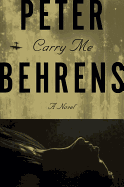
| Publisher: | Pantheon | |
| Genre: | Jewish, General, Fiction, Sagas, Historical | |
| ISBN: | 9781101870495 | |
| Pub Date: | February 2016 | |
| Price: | $26.95 |
| Fiction |
by Peter Behrens
In Carry Me, Peter Behrens (The O'Briens) writes a fresh story of Europe between 1910 and 1938, an era of war and political turmoil. Told through two extended families and in locales including the idyllic Isle of Wight, Germany and the United States, the novel features characters responding to their circumstances with compassion and hopefulness.
Narrator Billy Lange opens with "This will become the story of a young woman, Karin Weinbrenner," the woman he loves. Their parents reflect the century's conflicts: Billy's father, "Buck" Lange, is German Irish, and his mother, Eilin, is Irish Catholic, while Karin's parents, who employ the Langes, are Baron von Weinbrenner, a Jewish German millionaire, and his wife, an Irish Protestant aristocrat. "Birthplaces, nationality--such details have consequences in this story."
Chapters move among eras as Billy, Karin and their parents live through one war and move inexorably toward the next. After opening with brief family history from 1884 to 1913, Carry Me fast-forwards to 1938 and a letter advising Billy to examine his "attitude to the national and racial developments in our Germany." Billy and Karin, their lives entwined from childhood, fantasize about the American West of Karl May's cowboy novels. By 1938, Hitler is fully in charge, pushing toward war. "This all happened before I or anyone else had watched half a century's worth of films about secret police and Nazis and the brutality of ordinary 'decent' men in uniforms, so I didn't recognize the situation, I didn't know the story line." Billy convinces Karin to leave Germany for the States.
"In 1945 I found myself alive on the other side of history," Billy reveals, summarizing events through 1977. Carry Me's perspective on war's tragedies is beautifully composed, and heartbreakingly credible. --Cheryl Krocker McKeon, manager, Book Passage, San Francisco
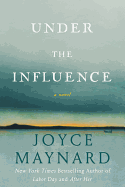
| Publisher: | Morrow | |
| Genre: | Suspense, Fiction, Thrillers, Contemporary Women, Family Life | |
| ISBN: | 9780062257642 | |
| Pub Date: | February 2016 | |
| Price: | $25.99 |
| Fiction |
by Joyce Maynard
Among the many mysteries in Under the Influence, Joyce Maynard's (After Her) ninth novel, is whether people believe the lies they tell themselves. Because there are as many lies and secrets as there are characters here, when the narrator tries to reinvent herself after a tragedy, the only person left to trust is the eight-year-old boy caught in the middle of it all.
Helen McCabe has had a hard life: a distant mother with a string of boyfriends, an emotionally abusive relationship and an alcohol problem. When a judge takes away her son, Helen feels that her life is over--until she meets Ava Havilland and her husband, Swift, an extravagantly rich and private couple. They become fast friends, to the point where Swift promises Helen he'll help get her son back. But, in the way that the Havillands treat their maid and Helen's new boyfriend, it becomes obvious they are hiding something.
As more is revealed about what, exactly, the couple is holding back, Maynard explores just how much Helen is willing to overlook and leaves it unclear whether Helen chooses to ignore her new friends' moral flaws or is blinded by her gratitude. The Havillands manipulate Helen so that she can't separate her own best interest from theirs, but will she will get out from under their influence before she loses herself completely? --Josh Potter
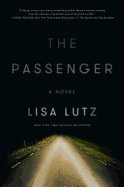
| Publisher: | Simon & Schuster | |
| Genre: | Suspense, Fiction, Psychological, Contemporary Women, Thrillers | |
| ISBN: | 9781451686630 | |
| Pub Date: | March 2016 | |
| Price: | $25.99 |
| Starred | Mystery & Thriller |
by Lisa Lutz
Tanya Dubois finds her husband, Frank, dead at the bottom of the stairs. "As far as I could tell, he fell down the staircase all on his own." The obvious next step, then, would be to dial 911, right? Wrong. Tanya changes her identity, acquires fake documents, and gets the hell outta Dodge. Because this isn't the first time she's gone on the run, and no one would believe she didn't kill Frank.
Soon after she leaves town, Tanya--now using the name Amelia Keen--meets Blue, a bartender who has unsettling hidden talents. She helps Amelia out of a sticky situation, but it's unclear whether Blue can be trusted--or will put Amelia in further danger. As her troubles escalate and more deaths occur, what does become certain to Tanya/Amelia (neither is her real name) is that the only way to stop running is to return to where she started and face her demons.
In her thrilling standalone, The Passenger, Lisa Lutz (the Spellman series) keeps the pace blistering without sacrificing characterization. She doesn't do perfect or cuddly; her people are regular folks doing the best they can with extremely bad luck. The protagonist, who goes through many name changes, is flawed and flinty, but her loneliness from her years in hiding is palpable. Blue is also vivid, someone with a sense of menace lurking beneath her coolness, keeping readers guessing about her motives. Both are women who start out as passengers in their own lives, until they decide it's time to take the wheel. --Elyse Dinh-McCrillis, blogger at Pop Culture Nerd

| Publisher: | Pantheon | |
| Genre: | Fiction, Science Fiction, Family Life, Time Travel | |
| ISBN: | 9780307907592 | |
| Pub Date: | February 2016 | |
| Price: | $27.95 |
| Science Fiction & Fantasy |
by Dexter Palmer
With Version Control Dexter Palmer (The Dream of Perpetual Motion) has written a slow burn of a near-future science fiction novel that manages to dive deep into themes of gender roles, grieving parents, the culture of academia, racism, what it's like to be a scientist and the fragile nature of causality violation--just don't call it time travel.
Rebecca Wright is married to physicist Phillip Steiner, the public face of the causality violation machine that he and his government-funded team have been testing for eight years. Phillip has trouble relating to people, but has found Rebecca "interesting," the highest form of praise from a socially awkward physicist.
In this near-future, the president interrupts television and radio shows to have personal chats with individuals, an online dating service employs algorithms and computing power to ensure its own future, and self-driving cars continue to evolve into spaces to relax and retreat while being taken anywhere.
Rebecca feels like something is wrong with reality, a discomfort--as though things just aren't the way they're supposed to be. Even the couple's personal tragedies seem somewhat off-kilter. Is it her grief talking, or something more sinister, something at the base level of reality itself?
Is the causality violation device, proven to not work hundreds of times, actually changing reality?
Version Control is a thoughtful look at a society's foibles through the lens of speculative fiction, while telling a compelling story that will engage readers from the first page. --Rob LeFebvre, freelance writer and editor
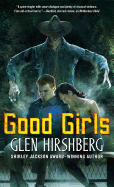
| Publisher: | Tor | |
| Genre: | General, Fiction, Fantasy, Horror, Urban | |
| ISBN: | 9780765337467 | |
| Pub Date: | February 2016 | |
| Price: | $26.99 |
| Science Fiction & Fantasy |
by Glen Hirshberg
Good Girls, sequel to Glen Hirshberg's Motherless Child, is a creepy, atmospheric novel that never lets up. The horror of choices made in the previous book are developed to their fullest here, with mistakes and luck playing as much of a role as careful planning or serious intent.
Rebecca has moved on from the orphanage that raised her. Though she still looks to her "parents" there--the childlike Joel and hard-as-nails Amanda--for comfort when life gets hard, Rebecca tries to make it on her own, living in an apartment with three roommates and working at a crisis hotline at the nearby college.
When a stranger calls, hinting at more than suicide, Rebecca has no idea how to react. What she doesn't know is that her caller is a vampire-like creature called the Whistler. Though he's not human, he is attracted to worldly subjects like classic rock music; he takes to the darkness to attack Rebecca's friends in an ever-closing circle of death and mutilation, to demonstrate his love for her calm, still demeanor and (unbeknownst to her) magical talents.
Jess, protagonist from the first novel, hires Rebecca to mind her baby, Eddie, and keep an eye on her bed-ridden husband, Benny. Jess doesn't mention the legless horror in the attic, though, which may end up killing them all.
Good Girls is a powerful continuation of Hirshberg's previous novel, full of creeping horror and believable characterizations, even of mythical creatures. --Rob LeFebvre, freelance writer and editor
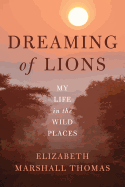
| Publisher: | Chelsea Green | |
| Genre: | Travel, Animals, General, Essays & Travelogues, Biography & Autobiography, Essays, Africa, Nature, Personal Memoirs | |
| ISBN: | 9781603586399 | |
| Pub Date: | February 2016 | |
| Price: | $17.95 |
| Biography & Memoir |
by Elizabeth Marshall Thomas
From an early age, Elizabeth Marshall Thomas has been enthralled with the natural world, and she shares her keen observations in her memoir Dreaming of Lions. Her parents, particularly her father, wanted Thomas to experience life fully, and the biggest influence on her life was when her parents took the family to live in the Kalahari Basin in Africa in 1951.
She carefully intertwines memories of her African experiences as her family followed the ways of the local Bushmen, or Ju/wasi, who lived near various waterholes in the Kalahari, with her adult life in the U.S. with her husband and children, their own journeys to Africa and their interactions with the Dodoth tribes. On these later trips, she encountered elephants and lions, hostility for being a woman and the violence of Idi Amin's regime.
Thomas deliberately doesn't follow a timeline; she tells her life's story by subject and themes rather than chronologically, which gives readers perspective on how this woman's creative mind works. From microscopic waterbears living in a drop of swamp water to the leopards that prowled next to her as she slept near a waterhole to the cougar that killed a doe in her yard, Thomas shares her awe of nature with readers, providing insight into the ways of animals that is obtained only after years of careful scrutiny. Candid revelations about her own struggles with alcohol and the medical traumas endured by her family round out this undeniably powerful narrative of life that is reminiscent of The Flame Trees of Thika and Out of Africa. --Lee E. Cart, freelance writer and book reviewer
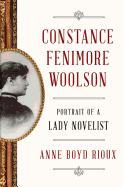
| Publisher: | W.W. Norton | |
| Genre: | Biography & Autobiography, Women, Literary | |
| ISBN: | 9780393245097 | |
| Pub Date: | February 2016 | |
| Price: | $32.95 |
| Biography & Memoir |
by Anne Boyd Rioux
Nineteenth-century novelist Constance Fenimore Woolson is one of the lost figures of American fiction. In her lifetime she was recognized as an important writer, but today she is generally treated as simply a footnote in the life of Henry James--the woman he feared committed suicide because he did not love her. In Constance Fenimore Woolson: Portrait of a Lady Novelist, literary historian Anne Boyd Rioux (editor of Woolson's Miss Grief and Other Stories, reviewed above) reclaims both Woolson's life and her work for a modern audience.
Rioux successfully navigates the balancing act at the heart of any literary biography. She considers Woolson's literary works--six novels and dozens of short stories--within the context of her life, but never reduces Woolson's fiction to mere biographical illustration. The end result is a portrait of a complex woman who chose a literary career over family and domesticity--one of the first women who successfully created such a life. Rioux presents Woolson as a serious writer who strove to portray the pressures of convention on women's lives within the format of the realistic novel. Like her male peers, Woolson traveled extensively in Europe, was a familiar figure in American expatriate circles in England and Italy, and occasionally retreated into solitude when the need to write was strong. Woolson's relationship with Henry James appears less as a story of unrequited love and more as the most important example of her lifelong efforts to find intellectual companionship and respect from her male peers.
Constance Fenimore Woolson is an engaging combination of storytelling and scholarship. --Pamela Toler, blogging at History in the Margins
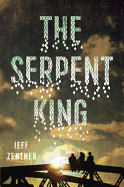
| Publisher: | Crown Books | |
| Genre: | General, Juvenile Fiction | |
| ISBN: | 9780553524024 | |
| Pub Date: | March 2016 | |
| Price: | $17.99 |
| Starred | Children's & Young Adult |
by Jeff Zentner
Debut author Jeff Zentner's The Serpent King is the mesmerizing story of three teenage misfits who band together in the Bible Belt town of Forrestville, Tenn.--a place Lydia Blankenship, for one, can't wait to escape when she graduates from high school. Lydia is a fashion-loving social-media maven who's bound for New York. Travis Bohannon's brutish father wishes he'd play football, but instead his sensitive son is obsessed with a fantasy series called Bloodfall, and is a sucker for anything with "the whiff of the firelit, ancient, and mysterious." Dillard (nicknamed Dill) Early--the grandson of the snake-obsessed "Serpent King" and son of a snake-handling preacher--is a talented singer-songwriter... and he's on edge.
Dill is so tense because he's living in the shadow of his imprisoned father. He's also secretly in love with Lydia, who is pushing him to go to college, while his mother wants him to drop out of school to earn money for the family. Dill's mother says, "You don't need options in life. You need Jesus. Options are fine if you've got them, but we don't." Told from a third-person point of view, this riveting novel takes turns zeroing in on each of the three friends. Pens would run dry if readers were to underline extraordinary sentences--the kind that are so true, or funny, or beautiful that they clamp hearts. The narrative swirls with the scent of shampoo, the stink of mold, warm evening winds, wood smoke, vultures turning in lazy circles. Zentner sings a song of deep pain and harsh reality, but also of fierce love and hope. --Karin Snelson, children's & YA editor, Shelf Awareness
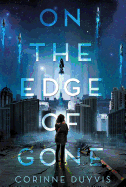
| Publisher: | Amulet/Abrams | |
| Genre: | Science Fiction, Family, Action & Adventure, Juvenile Fiction, Special Needs, Siblings, Survival Stories, Social Themes | |
| ISBN: | 9781419719035 | |
| Pub Date: | March 2016 | |
| Price: | $17.95 |
| Children's & Young Adult |
by Corinne Duyvis
At 16, Denise is used to difficulty. She's from a mixed-race family in Amsterdam, and she's on the autism spectrum. But now a comet is heading for Earth, and she knows she has far worse to get through. Her family is assigned to a shelter, but Denise's sister Iris is missing, and her drug-addicted mother can't even handle the basics when the world is not ending.
Corinne Duyvis (Otherbound), autistic and an Amsterdammer herself, has created a nuanced, compassionate character in Denise. She also imagines a believably devastated 2035--survivors stay connected through fading portable wrist tabs as they scavenge the flooded city under dust-storm skies. The author's real achievement, however, is in layering the inevitable dilemmas: If you can't save everyone, where do you draw the line? Denise stumbles upon a ship that's preparing for a multi-generation voyage to colonize another planet, but everyone must prove his or her usefulness to earn a spot on board, and she knows her mother is her biggest liability.
As Denise desperately works to join the ship, and searches for Iris, she pushes herself in ways she never thought she could. She isn't good at interpreting facial expressions, and her memorized social responses don't always work. Still, she keeps trying to connect and move forward. Denise says, "I don't think I'm built for the end of the world," but if she makes it, the end of the world may mean a new way of seeing herself.
On the Edge of Gone is an exciting read that packs in some deep thinking and real moral wallops along the way. --Ali Davis, freelance writer and playwright
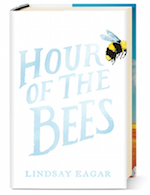
| Publisher: | Candlewick | |
| Genre: | Multigenerational, Death & Dying, Fantasy & Magic, Juvenile Fiction, Family, Social Themes | |
| ISBN: | 9780763679224 | |
| Pub Date: | March 2016 | |
| Price: | $16.99 |
| Children's & Young Adult |
by Lindsay Eagar
Twelve-year-old Carol is annoyed. Her friends will be whooping it up poolside in Albuquerque their last summer before junior high, and she's stuck with her family, headed for a remote, 200-acre sheep ranch in the middle of the hot New Mexico desert to visit her father's father, the Mexican American grandfather she's never met. It's a "summer-vacation-turned desert-hostage situation." To make matters worse, the purpose for their family trip is not for the three kids to finally be introduced to Grandpa Serge, it's to pack up the old man's house, sell the ranch and move him--against his will--into a home for dementia patients.
The ranch is bleaker than Carol imagined: "Across the rose-colored land, a run-down rambler sits in a browned pasture, its roof sagging, the porch beams warped with age." There's nothing for miles but coyotes, scorpions and fire ants. The dozen or so remaining sheep are skin and bones. And then there's Carol's grandfather, with his watery blue eyes "like faded jeans" and mottled face, who insists on calling her "Caro-leeen-a," and who can't understand why she "spits" on her Mexican roots by calling herself Carol. Even the ancient dog, Inés--despite what Grandpa says, she can't be the same dog Carol's dad grew up with--looks like a frizzled zombie.
It's a challenging, back-breaking summer. Working to get the ranch fixed up to sell while babysitting her one-year-old brother, Lu, in dangerous terrain and keeping an eye on Grandpa Serge isn't easy for Carol. Her 17-year-old half sister, Alta, isn't much help either, with her refusal to get dirty and her all-over-the-map moods: "She has the same heart-melting smile as Mom--only Alta's has fangs," notes Carol. Alta comes and goes as she pleases, reigns as "queen of the monosyllable" on her "Moody Alta" days, and wears platform wedges on the ranch when she should be wearing "snake-stomping boots."
As the days go on, however, the summer starts to feel less like a hostage situation for Carol. She loves the desert's strange beauty, the open sky, the stars, her mother's seemingly newfound flair for Mexican cuisine... and her grumpy grandfather starts to grow on her. Grandpa Serge tells her the wildest stories from the wicker chair on his porch roost, and every story begins with the same tree. Before long, Carol is begging him for the next installments.
Once upon a time, there was a tree, bigger around than three men could hug. Its leaves were emerald green, the bark black. The tree's branches dipped and curved like a lazy river, and its roots kissed the shore of a green-glass lake.
According to Grandpa Serge, the tree blossomed year-round with beautiful white flowers, "spicing the dry desert air with their honey-vanilla fragrance," and the bees kept it alive. For centuries, no one in the village ever died, and the tree healed the villagers' injuries. There was a boy named Sergio who loved a girl named Rosa, a girl who had "a wanderlust like a fever" and wanted to see the corners of the earth. Sergio was fearful, and wanted to stay close to home like all the other villagers always had. But since he loved Rosa, he had to accept her wandering.
Little by little, Carol starts to feel like her grandfather's stories may not be as far-fetched as they seem. For instance, Grandpa says bees used to follow Rosa around... and they follow Carol around, too. Grandpa says, "If you see any more bees, chiquita, tell me. The bees will bring back the rain." But Carol doesn't dare tell him about the bees she sees because of her family mantra: "Our number-one goal this summer is... not to upset Grandpa." Is it crazy for her to think the bees really might bring rain to the dying, drought-stricken land?
Debut author Lindsay Eagar skillfully blends a realistic, contemporary family drama with this dreamy, fairy-tale world of the green-glass lake that Grandpa Serge reveals to Carol through his enchanting stories. Will Carol's father make peace with Grandpa Serge after his 12-year-absence, and what drove them apart, anyway? Why won't anyone talk about Grandma Rosa, who died the same day Carol was born? Why is Alta so stubbornly clinging to her "half sister" status, a self-imposed black sheep? And what will happen to Grandpa if he has to leave the place he loves the most?
After a few scary and suspenseful moments on the ranch--and swirling questions about time, memory, legacy, belonging, fear and courage, life and death--Carol's friends' texts about pools and parties lose their urgency for her. By summer's end, Carol has fallen in love with her magnetic Grandpa Serge and his rose-colored sheep ranch, and she feels connected to her heritage to an extent she never could have imagined. Grandpa tells his granddaughter, "You belong with the stars, like [Rosa] did," and he makes her feel it's true.
Hypnotic and hopeful, Hour of the Bees pulls readers right into the heart of the hot New Mexico desert and its promise of magic. The importance of living without fear, embracing one's roots and finding our own families loom large in this debut novel that hums with life and love. --Karin Snelson, children's & YA editor, Shelf Awareness